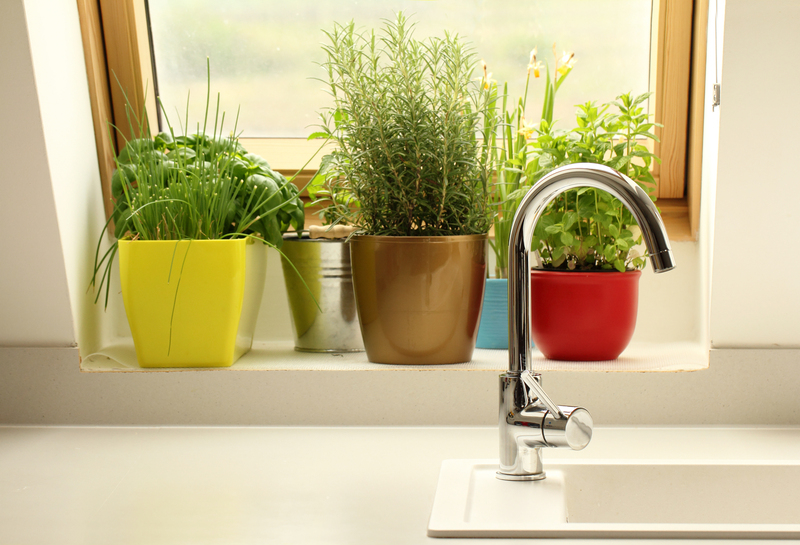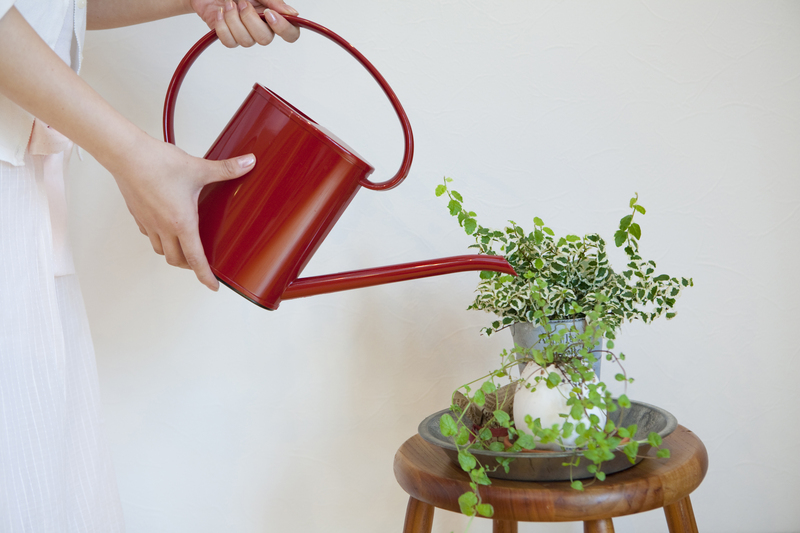Garden Tools Every Nature Lover Should Have
Posted on 20/08/2025
Garden Tools Every Nature Lover Should Have: The Ultimate Guide
Every nature lover dreams of cultivating a thriving garden, where blooms burst with color and vegetables flourish. Yet, the secret to a lush and vibrant garden lies not just in the seeds you sow, but in the garden tools you wield. Whether you're a budding horticulturist or a seasoned green thumb, having the right tools makes all the difference. In this comprehensive guide, we'll explore essential garden tools every nature enthusiast should own, tips for tool care, and creative uses that enhance your gardening experience.

Why the Right Garden Tools Matter
Gardening tools are more than mere accessories -- they're your partners in nurturing life. The correct set of implements saves time, improves results, and even prevents unnecessary strain. Investing in high-quality, ergonomic tools helps ensure each season in your garden is rewarding and productive.
- Efficiency: Good tools make tasks like digging, pruning, and weeding faster and easier.
- Better Results: Proper tools can boost plant health and productivity.
- Comfort: Ergonomic designs reduce fatigue and the risk of injury.
- Longevity: Quality implements last for years, offering great value.
Essential Garden Tools For Every Green Thumb
1. Hand Trowel
Among the must-have garden tools, the hand trowel stands out. This small yet sturdy implement is perfect for transplanting seedlings, digging holes, and scooping soil or compost. Choose a trowel with a comfortable grip and a rust-resistant blade for longevity.
- Ideal for container gardening and bed planting.
- Narrow blades are good for precision planting near roots.
- Wider blades help with larger scoops and moving soil.
2. Pruning Shears (Secateurs)
Pruning shears or secateurs are indispensable for keeping shrubs, perennials, and fruit trees healthy. They allow precise snipping of stems, deadheading flowers, and harvesting fruits or herbs with minimal plant trauma.
- Choose bypass shears for live plants; anvil shears for deadwood.
- Look for ergonomic handles and replaceable blades.
- Keep blades sharp for clean cuts that promote healthy regrowth.
3. Garden Fork
A garden fork is perfect for turning soil, aerating beds, and integrating compost. A sturdy, high-quality fork makes working in heavy soil or clay easier, preventing strain on your wrists and back.
- Four-tined models are great for breaking up compact soil.
- Curved tines help lift roots and bulbs gently.
- Stainless steel tines resist rust and damage.
4. Watering Can or Hose
Water is life for a garden, and investing in a watering can or high-quality hose ensures your plants get what they need with minimal waste. A can with a detachable rose head allows for gentle watering of seedlings, while a hose with an adjustable nozzle is invaluable for larger spaces.
- Opt for lightweight, balanced cans for easy carrying.
- Metal hoses or reinforced rubber last longer than plastic.
- Drip irrigation tools can save water and time for busy gardeners.
5. Garden Spade
The garden spade, with its sharp, flat blade, is a versatile tool for digging, edging, lifting, and dividing plants. It is crucial for landscaping, creating borders, and preparing new beds.
- Fiberglass handles offer durability and resists rot.
- Look for footrests for better leverage while digging.
- Short-handled spades provide better control in small spaces.
6. Rake
From gathering leaves to leveling soil, a garden rake is essential. Steel tines work best for breaking up soil or gravel, while flexible plastic rakes efficiently gather grass clippings or leaves.
- Adjustable rakes can cover a variety of surfaces and job sizes.
- Smaller hand rakes help in tight beds or containers.
7. Weeder
Maintaining a weed-free garden preserves nutrients for your chosen plants. A hand weeder helps remove unwanted growth by the root, reducing regrowth. This tool is especially helpful in organic gardens, minimizing the need for herbicides.
- V-shaped blade models pry out deep-rooted weeds.
- Ergonomic handles help reduce hand fatigue.
8. Wheelbarrow or Garden Cart
For moving soil, compost, plants, or even bulky tools, a sturdy wheelbarrow or garden cart is invaluable. It reduces the risk of back injury and will save time on large gardening projects.
- Choose single- or double-wheeled models for various terrains.
- Look for rustproof and lightweight materials.
- Foldable carts save space in small sheds or garages.
9. Garden Gloves
Protecting your hands means you can garden longer and more safely. Garden gloves shield you from thorns, chemicals, and blisters. Breathable, water-resistant gloves are best for all-season comfort.
- Leather gloves for tough tasks; nitrile for delicate work.
- Ensure a snug yet comfortable fit for dexterity.
10. Hoe
A garden hoe makes short work of breaking up soil and controlling weeds. There are several designs, including Dutch, stirrup, and draw hoes, each suited for specific tasks.
- Stirrup hoes slice through weeds without disturbing soil much.
- Draw hoes are best for shaping soil and making furrows.
Bonus Tools Nature Lovers Swear By
Compost Bin or Tumblers
Embrace sustainability with a compost bin. Turning kitchen and garden waste into rich compost improves soil fertility and reduces landfill waste. Tumblers make aeration easy and speed up the composting process.
- Dual-chamber bins allow steady compost production.
- Choose the right size based on your garden needs.
Garden Kneeler or Pad
Kneeling for extended periods can be tough on the joints. A padded kneeler or bench protects your knees, making planting and weeding more comfortable. Many models double as sturdy garden seats!
Soil Testing Kit
A soil testing kit offers invaluable insights into the pH and nutrient content of your garden beds. Balancing your soil ensures optimal plant growth and can save money on unnecessary fertilizers.
How To Choose Quality Garden Tools
With so many options on the market, selecting the best gardening tools can be daunting. Here's how to make the right investment:
- Material Quality: Stainless steel and carbon steel are durable choices.
- Ergonomics: Choose tools with comfortable grips and balanced weight.
- Purpose: Consider your most frequent tasks and choose accordingly.
- Brand Reputation: Read reviews, ask fellow gardeners and try before you buy when possible.
Remember, well-made tools are an investment, not just an expense.
Creative Ways to Use Your Garden Tools
- Old trowels can double as unique plant markers.
- Broken rakes serve as wall organizers for other tools.
- Large spades can help create natural stepping-stone paths.
Caring For Your Garden Tools
Proper maintenance of your gardening tools preserves their effectiveness and extends their lifespan. Here's how to keep your implements in top condition:
- Clean tools after each use to remove soil and sap.
- Sharpen blades regularly for clean, easy cuts.
- Oil moving parts and metal surfaces to prevent rust.
- Store tools in a dry, sheltered area.
Inspecting your tools at the start and end of each season can save you from unexpected breakdowns.
eco-Friendly and Sustainable Gardening Tool Choices
Growing concerns over the environment have increased demand for eco-friendly garden tools. Consider tools made from sustainable wood, recycled plastics, or those with biodegradable packaging. Solar-powered water timers and rain barrels further minimize your ecological footprint.
- Choose replaceable parts over disposable models.
- Support brands committed to ethical manufacturing.
Safety Tips When Using Garden Tools
- Always wear gloves and protective eyewear when cutting or sawing.
- Use tools for their intended purpose to avoid injury.
- Keep sharp tools out of reach of children and pets.
- Store heavy items at ground level to prevent accidents.

Frequently Asked Questions About Garden Tools
Q: How often should I replace my garden tools?
With regular maintenance, high-quality tools can last many years. Signs that it's time for replacement include persistent rust, cracked handles, or bent and damaged parts that cannot be repaired.
Q: Is it worth investing in electric or battery-powered garden tools?
For large gardens or frequent gardening, electric tools like trimmers or tillers save time and effort. For smaller gardens or eco-conscious gardeners, hand tools are sufficient and more sustainable.
Q: Which garden tools are best for small spaces or balconies?
Compact, lightweight tools such as hand trowels, pruners, and small rakes are ideal for small gardens and container plantings.
Conclusion: Equip Yourself for Garden Success
If you love nature and gardening, investing in the right garden tools will transform your experience. From hand trowels to sturdy gloves, each implement serves a vital purpose. With smart choices, creative usage, and proper care, your garden tools will empower you to cultivate beauty, sustainability, and nourishment in your outdoor oasis year after year.
Whether you're growing vegetables, cultivating roses, or simply enjoying the peace that gardening brings, equip yourself with these essential garden tools every nature lover should have. Your garden -- and your spirit -- will thank you!
Latest Posts
From Waste Pile to Garden Delight: Soil Enrichment Unleashed
Mastering the Art of Weatherproofing Your Garden Space
Container Gardening: Cultivating Creativity

